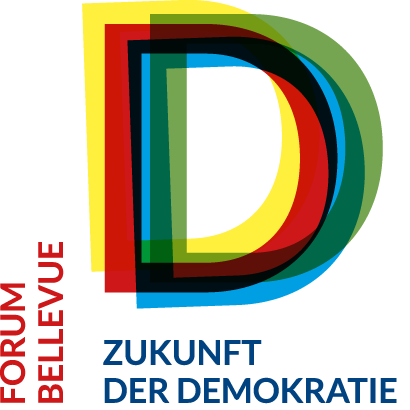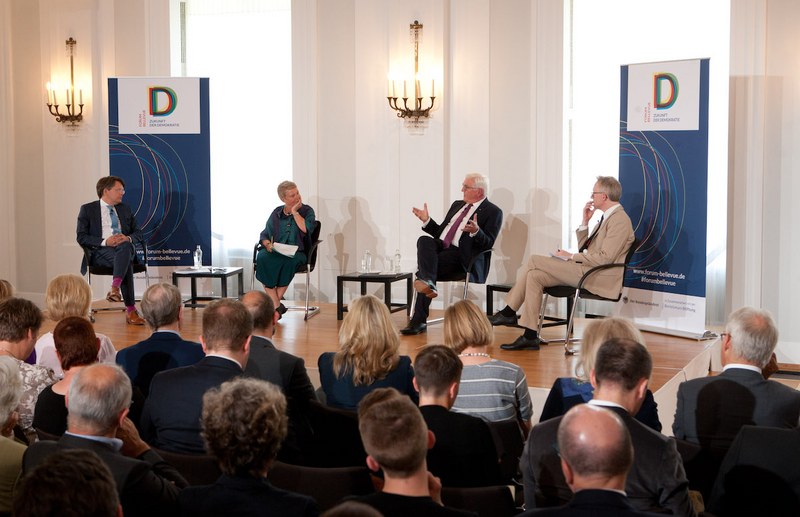"Society without Politics? Liberal Democracies Put to the Test"
23 May 2018
Why have politics and in particular political office acquired such a negative reputation, and how can we once again inspire people to become active in politics? These are the questions addressed by Federal President Steinmeier together with journalists and scholars at the third "Forum Bellevue on the Future of Democracy".
"Something has begun to slide," stated Federal President Frank-Walter Steinmeier at the beginning of his speech, thereby setting the tone for the discussion following. For the fourth edition of the discussion series "Forum Bellevue on the Future of Democracy", the Federal President chose to address a key issue on a special date: May 23, 1949, the day that the Basic Law of the Federal Republic of Germany, the German constitution, was announced. Exactly 69 years later, the Federal President sat down, together with the Italian political scientist Donatella della Porta, the Belgian historian and founder of the citizens' platform "G1000," David Van Reybrouck, and the German lawyer and legal philosopher Christoph Möllers, to discuss the question why, more than ever before, democracy must demonstrate its legitimacy and what can be done about the challenges to our democratic order.
To begin, Federal President Steinmeier pointed out that the constitutional order indeed formed the basis of a functioning democracy, but that democracy was truly brought to life by "democrats." It needs people who are willing to get involved, who respect others as equals and who do not put their own interests first. According to Federal President Steinmeier, this also presupposes "an interest in the community and the courage to compromise."
Can lotteries save democracy?
However, it is precisely this ability to compromise that we so sorely lack, stated the historian Van Reybrouck who, in his publications, advocates for greater citizen participation and additional forms of participation, among other things. In his view, "Today, forming a government is more difficult than it has been since World War II." According to Van Reybrouck, the weight of the next elections and politicians' fear of upcoming elections nearly crush efforts to form a government. As a result, many politicians are unable to form a compromise. Van Reybrouck sees a solution, both for finding a compromise and for bridging the growing gap between governments and the governed, in strengthening so-called citizen dialogues and new forms of participation. He pointed here to successful model projects in Gdansk, Madrid or Toronto, but also to the Irish referendum on a draft for a new abortion law: "Politicians did not dare, for understandable reasons, to take on this highly moral and emotionally loaded topic as a decision for themselves," explained Van Reybrouck. With the input of citizens selected by a lottery who met with experts for several months to discuss the subject, a draft of the legislation was put up for public vote through Parliament. A process which, according to Van Reybrouck, would probably not have proved successful for such a polarizing issue under normal parliamentary conditions. In parliaments more broadly, he misses the "sounds of democracy" – the discussion and debate.
But a louder noise level is itself no proof of more democracy, countered Federal President Steinmeier. He referred to the growing number of divisions and the emotional intensity with which debates are fought rather than simply conducted – particularly in digital contexts. Wherever one can choose between a "yes" or a "no," more people seem to enjoy taking part. But wherever democratic grassroots work is required, for example at the local level, the willingness to engage is declining. The participants avidly discussed the reasons of this development: the acceptance of parliamentary decision-making processes or the structures of party politics. Nonetheless, the panelists did agree that democratic institutions must somehow adapt and adjust in order to narrow the gap between parties and the public. In this context, Christoph Möllers spoke of a dangerous indifference: "If too many people rely on a political system without supporting it because it has always worked, this marks the success of the political system, but it is also dangerous for our democratic future," said Möllers. This becomes apparent when the established system hits a crisis. According to Möllers, Western democracies are in an era of transformation: They are moving away from the classical structures of organized parties toward political movements that seem more contemporary and attractive, particularly for younger people.
For Donatella della Porta, the emergence of new political movements is basically a positive development. For her, the fragmentation of the party landscape is a consequence of the multiple social cleavages that have materialized in recent years. "New political movements can, initially, provide important input and stimuli for existing parties," said della Porta. This also means that in today's world, the definitional scope of the concept of the "political" must be expanded significantly. Politics involves much more than just parliamentary debates and voting.
Uncertainty in an era of prosperity: Why are fears growing?
At the end of the discussion, the federal president asked why protest movements are emerging at a time when, at least in Germany, prosperity is increasing. Christoph Möllers emphasized the need for a new democratic vision for the future. "Democracy must always go forward. If it does not offer a forward-looking vision, citizens could turn their backs on it." David Van Reybrouck spoke of the permanent "compulsion to renew": Many areas of modern society have become democratic, including education, communication, and the spread of information. Democracy, too, must also democratize and do more to involve its citizens. The need for ongoing innovation was recognized by the Italian author Guiseppe Tomasi di Lampedusa, who wrote in his world-famous novel The Leopard: "Everything must change so that everything can stay the same."
Previous events in the series, which have taken place in cooperation with the Bertelsmann Stiftung, have focused on "What future does the West have?", "Freedom of thought in troubled times" and "Fact or fake? An important distinction for democracy."
The speech of the Federal President for the event can be downloaded here. (pdf).

